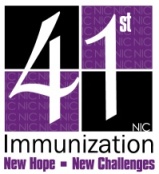
|
|
CDC NIP/NIC Home Page
|
Tuesday, March 6, 2007 - 4:35 PM
49
The Role of Health Care Providers in Influencing Parental Vaccine Refusal: A Case Control Study
Daniel A. Salmon, William K. Pan, Saad B. Omer, Walter Orenstein, Edgar Marcuse, James Taylor, M. Patricia DeHart, Shannon Stokley, and Neal Halsey. Epidemiology and Health Policy Research, University of Florida College of Medicine, 1329 SW 16th St, Room 5130, Gainesville, FL, USA
Learning Objectives for this Presentation:
By the end of the presentation participants will be able to:
1. Recognize differences in vaccine knowledge, attitudes and practices of health care providers who care for vaccinated and unvaccinated school aged children; and
2. Identify associations between parental and provider vaccine attitudes and beliefs.
Background:
The success of immunization programs has resulted in parental fear shifting from diseases to vaccines. When diseases are prevalent, the public has a natural fear of disease and actively seeks prevention through immunization. Yet, when high levels of immunization coverage have been maintained, disease is reduced and public attention shifts to fear of the vaccines rather than fear of the diseases. Concerns about vaccine safety can lead to a loss in public confidence in vaccines with potential resurgence of disease. Health care providers have a tremendous influence on parental vaccine decision. Yet, the role of health care providers in impacting parents who refuse vaccines by claiming non-medical exemptions has not been explored.
Objectives:
To examine the role of health care providers in impacting parental vaccination decisions.
Methods:
We conducted a mailed survey of 712 primary care providers identified by parents of vaccinated and unvaccinated (exempt) school age children.
Results:
We received completed surveys from 84.3% of eligible providers. Health care providers of exempt children differed in their vaccine related knowledge, attitudes and practices from health care providers of vaccinated children. In addition, parental and provider vaccine knowledge, attitudes and beliefs were highly associated. The most striking difference between exempt and vaccinated providers related to perceived vaccine safety and key immunization beliefs related to vaccine safety.
Conclusions:
These findings suggest that the knowledge, attitudes and practices of health care providers may have an important contributing affect on parental decisions to accept or forgo vaccination.